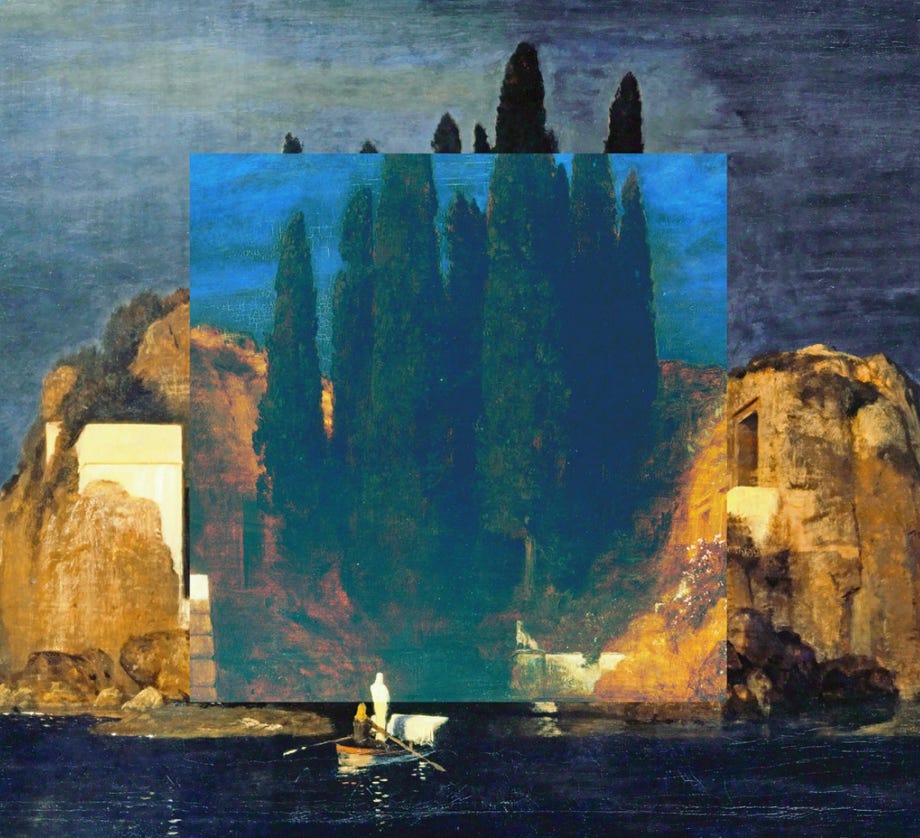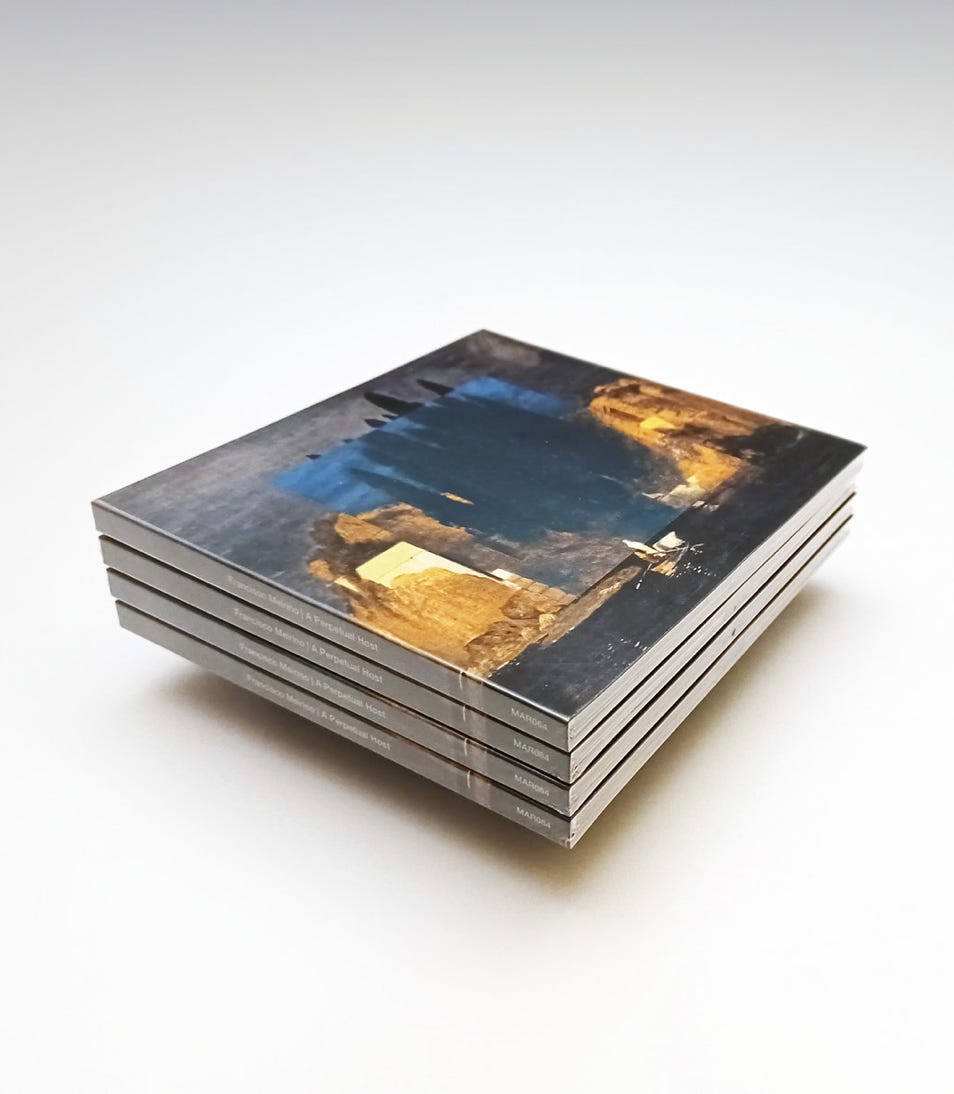


A P E R P E T U A L H O S T
CD, Misanthropic Agenda, 2024, MAR 064, 4 panel digipack, matte finish, Ltd 250
A deep dive into personal loss and the banalities of life and art, A Perpetual Host captures the raw, solitary, and often acerbic extremes that drive creation. Across four pieces, Meirino explores sonic tension and boredom, questioning the simplicity and complexity of the mundane with bursts of clarity that redefine existence itself. (label description)
Tracklist.
*Something Always Remains 15:15
**Fathers (Purgatory-Causality-Self) 13:54
***You Are Here And There Is No Cure For That 19:36
*There Is Nothing For Us Here 14:50
Assembled and mastered at Shiver Mobile, Lausanne, 2019-2023.6.
Francisco Meirino : synthesizers [ eurorack, serge], field recorders, microphones, computer, autoharp, shruti box, resonator guitar, voice, violin, reel-to-reel tape recorders, tap echo and homemade electronics.
*Slightly different edits previously released in 2021 as a cassette on Research Laboratory RL0147
**A piece for 8 speakers, premiered in 2022 at Supersonique, Marseille, France
*** A piece for 20 speakers, premiered in 2021 at The Centerpoint, Lausanne, Switzerland
Design. collage and layout - Francisco Meirino
Cover painting (public domain) by Arnold Böcklin
REVIEWS
As this is Swiss composer Francisco Meirino’s fourth album on Misanthropic Agenda, I am sure I missed one or two; I probably missed a few more overall, which is sad as I continue to like his work. He started as a laptop artist under the name of Phroq, but when he began using his own name, his music became more of a thing of his own. One essential new ingredient in his work is the use of what he calls ‘the end of life of electronic devices’, which indeed calls for exciting sounds, bursting and cracking, the last breath of a machine. You could also see that as a statement, about the state of our society, about ecological matters. I don’t know if these things matter to Meirino. He also uses ” electrostatic noise, magnetic fields and the unconventional use of music hardware and sound systems”, which translates as “the modular synthesizer (Eurorack-Serge), various microphones, the computer, the field recorder, tape recorders and tape echoes, EMF detectors and various home-made electro-acoustic devices”. In his work, Meirino uses the cut-up technique, brutal cuts, to make abrupt changes to the scenery.
Also mentioned is “Meirino explores sonic tension and boredom, questioning the simplicity and complexity of the mundane with bursts of clarity that redefine existence itself”, which seems a bit much, redefining existence itself. Still, there is certainly some weight to his music. Meirino uses ‘heavy’ sounds. In the opening piece, ‘Something Always Remains’, some Zeitkratzer-like sounds of string instruments are plucked manually and mechanically but then slowly opened, and later, sounds become sparse. There is a more acoustic treatment of acoustic sounds (drum?).
The computer plays the all-defining role here; minor details are amplified, cut away, and reversed, and open microphones pick up sounds from speakers, adding natural spatial quality to the music. Sometimes, it almost sounds like it is played in your living room. While some of this is quite loud and abrasive, I don’t think Meirino is interested in playing the noise card. His music often sinks to barely audible, but it picks up the volume again and can quickly grow into massive, intense work. Minimalism plays a primary role, but never too long. Sometimes, his work reminded me of Dave Philips and Rudolf Eb.er, sharing a love for solid amplification of the slightest sounds but less feral and more from acoustic objects and electronic manipulations.
These four pieces span nearly an hour’s worth of music, each about fifteen minutes long. It is long and heavy, yet there isn’t any moment of boredom in the music. It leaves you somewhat exhausted behind, but I found this ultimately rewarding experimental music. Exactly as I like them: complex, loud, engaging, quiet and created with great care and consideration.
(FdW)
________________________________________________________________________________________________________________________
Francisco Meirino is a Spanish sound artist based in Switzerland who has been active since 1994 creating a musical proposal that combines the use of sound design software and the end of the useful life of electronic devices.
His discography includes more than 70 albums alone and in collaboration with other artists such as Jason Kahn, Bob Bellerue, Matthias Gustafson, Jérôme Noetinger, Laurent Güdel, Antoine Chessex and Lasse Marhaug, among other musicians. He has performed more than 150 live performances in various venues and festivals in Europe, Japan and North America.
“A Perpetual Host” – fourth album on Misanthropic Agenda -, consists of four electroacoustic pieces ranging from bursts of abrasive noises and moments close to silence, and the agony of the electronic devices, created with the use of a modular synthesizer, several contact microphones, computer, field recorder, among other electroacoustic devices, tapes.
In “Something Always Remains” that opens this album, Meirino displays an array of metallic elements producing a rattle for several minutes until it ends, then moving on to inaudible microscopic pieces as if they were transported through electromagnetic fields, while granular noises emerge from time to time, glitches, among others. “Fathers” features processed vocals, found object recordings, and digital clicks. “You Are Here And There Is No Cure For That” contains the strumming of strings, along with spaces of silence that are interrupted by abstract noises and tapes in reverse.
“There Is Nothing For Us Here” oscillating noises mix with the rubbing of metallic elements unfolding vast drones.
Francisco Meirino develops dying, tiny sounds, and at the same time occupies the spatiality of his immediate surroundings.
(Guillermo Escudero)
________________________________________________________________________________________________________________________
In Actu Musique RTS (+ Audio in french)
Quatrième album studio solo de l’artiste lausannois Francisco Meirino, "A Perpetual Host" est sorti fin janvier 2024 sur le label Misanthropic Agenda. Une plongée profonde dans l’histoire personnelle de l’artiste qui combine à travers quatre morceaux des textures complexes d’une précision remarquable, un large panoramique spatial ainsi qu’une narration quasi radiophonique. Anne Gillot nous emmène dans l’atelier de l’artiste à la place des Terreaux à Lausanne pour y découvrir son "instrumentarium" fait de synthétiseur modulaire, de divers microphones, ordinateur, enregistreur de terrain, magnétophones et échos de bande, détecteurs de champs électromagnétiques et divers dispositifs électroacoustiques faits maison, quelques instruments à cordes dénichés dans des brocantes ainsi qu’une auto-harpe d’occasion.
________________________________________________________________________________________________________________________
IN Muisques d’Avenir (RST2) PODCAST : 1 hour interview on Swiss national radio (in french)
________________________________________________________________________________________________________________________
A Perpetual Host is Francisco Meirino’s fourth full-length, solo studio album on the Misanthropic Agenda label, and is described as “A deep dive into personal loss and the banalities of life and art, A Perpetual Host captures the raw, solitary, and often acerbic extremes that drive creation.” It’s a fitting description, because the music here is focused on ‘sonic failures’ (such as electrostatic noise) and utilises field recordings to create music that is designed to challenge. This is one of those albums where each and every listen delivers something new and rewards multiple plays. Highly recommended for fans of the experimental / electronic side of the genre!
________________________________________________________________________________________________________________________
Francisco Meirino’s "A Perpetual Host" is not an album that coddles the listener. It doesn’t beckon you in with soothing melodies or gently ease you into its sonic universe. Instead, it drops you into a meticulously constructed, often abrasive landscape where every sound feels both alien and unnervingly familiar, like the static-filled remnants of a half-remembered dream. This is Meirino’s fourth solo studio album on Misanthropic Agenda, and it showcases his ability to turn the failures of electronic devices, the buzzing of electromagnetic fields, and the fleeting life of acoustic objects into a form of high art.
The album opens with "Something Always Remains", a piece that feels both mechanical and organic. The track begins with a rattling metallic clatter that could easily be mistaken for a field recording of some obscure industrial process. These sounds give way to microscopic glitches and granular noises that seem to flutter around like digital insects. Meirino’s mastery of contrast is on full display here; the track oscillates between moments of near silence and bursts of abrasive sound, creating a tension that’s palpable. As these elements unfold, you get the sense that Meirino is dissecting the very essence of sound, peeling back layers to reveal the raw, unpolished core underneath.
"Fathers (Purgatory-Causality-Self)" brings a different texture to the table, with processed vocals and found object recordings creating a sense of dislocation. The piece is punctuated by digital clicks and cut-up techniques that make it feel like a fractured narrative — something that’s been broken apart and reassembled in a way that only vaguely resembles its original form. There’s a ghostly quality to the track, as if the sounds are haunted by the echoes of what they once were. Meirino uses these sounds not as mere embellishments, but as the foundation of the piece, crafting a sonic environment that feels both oppressive and strangely inviting.
The third track, "You Are Here And There Is No Cure For That", is a sprawling 19-minute composition that might be the album’s most challenging yet rewarding offering. Here, Meirino incorporates the strumming of strings, abstract noises, and reversed tapes to create a soundscape that feels both expansive and claustrophobic. The interplay of silence and sound is critical; Meirino isn’t afraid to let the music breathe, to allow the silence to speak as loudly as the noise. This track encapsulates the essence of the album—an exploration of the inescapable present, rendered in sonic form.
Finally, "There Is Nothing For Us Here" closes the album on a fittingly bleak note. The track’s oscillating noises and the rubbing of metallic elements create a vast drone that feels like the sonic equivalent of staring into the void. It’s a piece that demands patience, rewarding those who are willing to sit with its discomfort with a deep, meditative experience. The sound is expansive, occupying the full spatial spectrum, yet it retains an intimate quality—as if these sounds are emanating from the room right next to you, or perhaps from the space just behind your own mind.
Meirino’s "A Perpetual Host" is a masterclass in the art of electroacoustic composition. It’s an album that challenges the listener to rethink their relationship with sound, to consider the music not as a passive experience but as an active, almost confrontational engagement with the very fabric of reality. This is music for those who appreciate the beauty in decay, who find solace in the uncomfortable, and who seek art that pushes the boundaries of what is possible. In "A Perpetual Host", Meirino doesn’t just create music—he creates a world, and invites you to explore its every unsettling corner.



